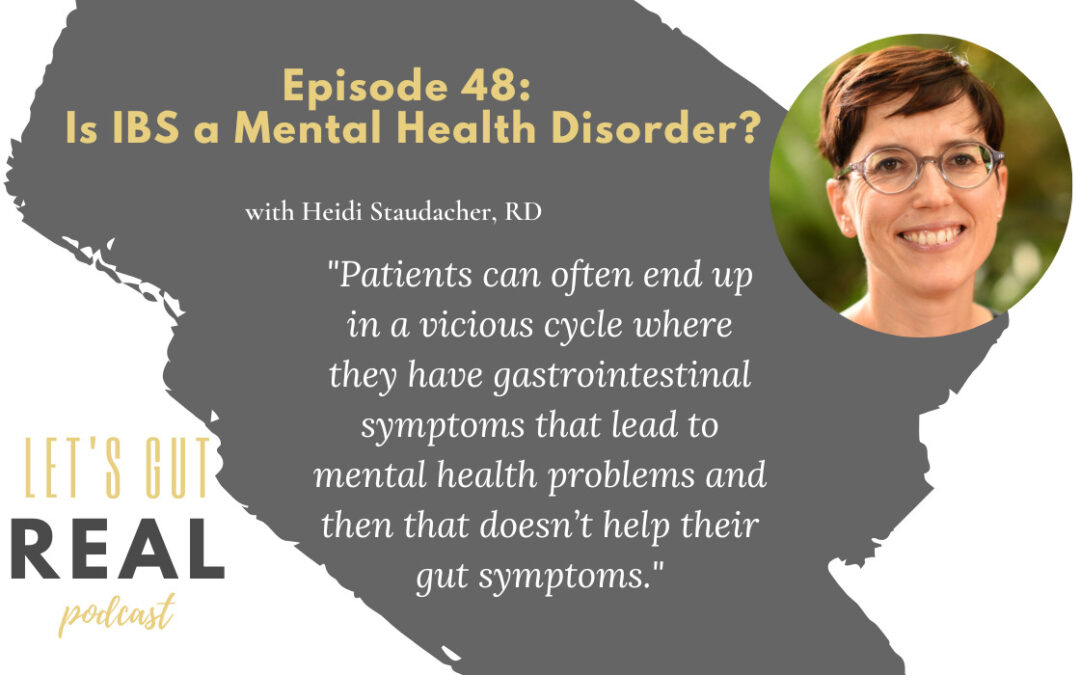In the last few years there has been a huge growth in the awareness of the role of mental health in gut dysfunction. This week I interview registered dietitian Heidi Staudacher on the relationship between mental health and IBS, and the role of nutrition in both gut symptom management and mental health.
Nutrition Pearls for Functional Gut Disorders and Mental Health:
- Know that one of the main things that leads to the development of IBS is gut-brain dysregulation.
- Research suggests that about half of IBS patients who have mental health problems have the gut symptoms first and then the mental health symptoms come later. Whereas the other half of these individuals have mental health symptoms first and then gut symptoms come later.
- The Mediterranean diet has shown significant effects on reducing depressive symptoms.
- Inflammation in the brain is thought to be a potential contributor of mental health issues.
- One way diet influences mental health is through the gut microbiota.
- Changes that positively influence the gut microbiota for mental health will probably also positively influence IBS as well.
- Understand the importance of screening patients before recommending a restrictive diet – especially for patients with gastrointestinal disorders – as they have higher rates of disordered eating.
Did you know that it is more common to have anxiety and depressive symptoms if you have IBS compared to if you don’t have IBS? This week I interview Heidi Staudacher and we discuss how patients can often end up in a vicious cycle where they have gastrointestinal symptoms that lead to mental health problems and then that further leads to more gut symptoms.
Heidi Staudacher is an accredited practising dietitian and has had extensive experience in the clinical management of people with clinically functional gastrointestinal disorders. Heidi completed her PhD at King’s College London in 2016 in which she investigated the use of the low FODMAP diet in irritable bowel syndrome and its impact on symptoms, the microbiota and diet quality. Her research interests include understanding the effect of different dietary components on gut microbiota, and therapeutic diets for gut disorders and their influence on gut microbial composition. She is passionate about conducting high quality research in the field of diet and gut health.
We talk about:
- How Staudacher became interested in the area of functional gut disorders and mental health
- The prevalence of mental health disorders in IBS
- How IBS impacts mental health
- Whether or not developing IBS predisposes individuals to developing mental health issues
- The chicken or the egg relationship with mental health and IBS
- How so many patients have heard the phrase ‘it’s all in your head’ and how the onus is placed on patients to ‘fix’ their IBS and how distressing that can be
- When patients feel like it’s their own fault through challenges with their mental health that they have IBS
- How nutrition influences mental health in IBS
- Some interventions for IBS that have been shown to improve mental health
- Whether or not changing the gut microbiota might influence mental health and IBS.
- The role of probiotic, prebiotics, and dietary changes in order to change the gut microbiota
- The influence of diet on mental health in IBS. Including the impact of disordered eating and eating disorders
- The big take aways clinicians need to know regarding the intersection of mental health in functional gut disorders
Connect with Staudacher on Twitter or on their website at foodandmoodcentre.com.au as well!



Recent Comments